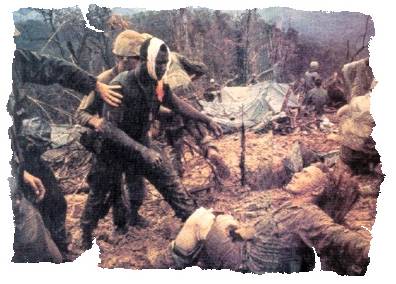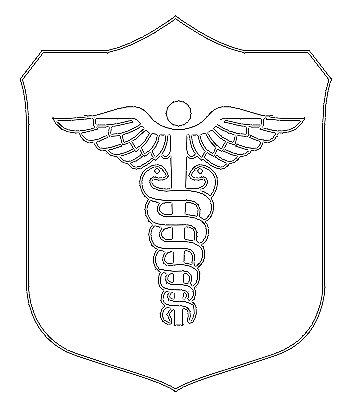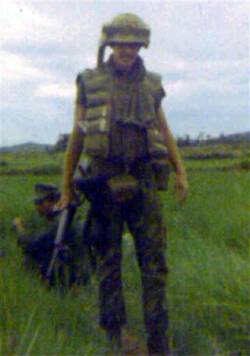Call me Corpsman, call me ‘Doc’
By KEITH POUNDS February 13, 2010
Perhaps to the surprise of some, I won’t blast our President on his inability to pronounce the word “corpsman” (which he pronounced “corpse man”). Instead, I’d like to take the opportunity to give much-needed praise to Navy/Fleet Marine corpsmen who are, as you will see, a special breed of warriors.
During my own service as a corpsman, I served at the Naval Hospital, Camp Lejeune, N.C., as well as onboard the USS Joseph Hewes (FF-1078) home-ported in Charleston, and with the 4th Marine Division, New Orleans, La. My specialties included combat casualty care and nuclear, biological and chemical warfare. It’s fair to say I know what I’m talking about.
After initial basic training (boot camp), perspective corpsmen are sent for medical training at the Naval School of Health Sciences in San Diego, Calif. From there they can specialize in any number of medical ratings including X-ray technician or pharmacy technician.
Corpsmen act as health advisers and emergency first responders for the Navy and the Marine Corps. They treat a variety of illnesses from the common cold to decompression sickness requiring hyperbaric treatment.
Many attend Fleet Marine Service School, where they are trained in all aspects of Marine Corps operations. From there, they can further specialize as a Special Amphibious Reconnaissance Corpsman or FMF Recon.
Corpsmen stationed with a Marine unit or far out at sea on a Navy warship often find themselves in volatile, life-threatening emergency situations. There are often no sterile operating rooms and equipment. Doctors and nurses are often miles, if not hours, away. As one author wrote, “Bunkers become operating rooms, shirts become tourniquets, and corpsmen become miracle workers.”
For a corpsman, being stationed with the Navy means serving in a Navy hospital or clinic or onboard a U.S Navy ship. We call this being “on the blue side.” For corpsmen stationed on “the green side,” it means serving as a specialist in emergency medicine and combat care with the Marine Corps.
Ask almost any Marine who has been in combat what the phrase “Corpsman up!” means and he’ll tell you it’s a cry for what the Marine Corps calls the “angels in green.” These are U.S. Navy hospital corpsman specially trained for combat medicine.
Combat corpsmen are trained in patrols, tactics and navigation and wear the same grungy, dirty, sweaty uniforms as Marines and serve as the front-line emergency medical response personnel, very often under enemy fire with little regard for their own safety.
As many corpsmen share a space on memorial walls with the Marines they tried to save, they have adopted as one of their mottoes, “Where angels and Marines fear to tread, there you’ll find a corpsman dead.”
In World War II 1,170 corpsmen lost their lives. In Korea it was 108. In Vietnam, 638. Fifteen died as a result of the bombing of the Marine barracks in Beirut in 1983. Seven corpsmen have been killed in Afghanistan and 31 have died in Iraq.
As further testimony to the bravery and commitment of our corpsmen on the battlefield, they have received 1,582 Bronze Stars, 946 Silver Stars, 31 Distinguished Service Crosses, 174 Navy Crosses and 22 Medals of Honor.
There have been 20 Navy ships named after corpsmen. Corpsman John “Doc” Bradley was one of the six men photographed by Joe Rosenthal raising the second United States flag on Iwo Jima during World War II.
As any corpsman will tell you, few honors sit on one’s heart as well as being called “Doc” by your Navy and Marine buddies.
Quoted in the Navy News Service article, “The Making of a Fleet Marine Force Corpsman,” Marine Corps Staff Sgt. Richard Lister said, “A doc is someone you can count on. He’s someone in your platoon that when something happens to one of our fellow Marines, you can call on him and not have to worry. He’s your buddy, a comrade in arms, a person who you count on to cover your back, to lay down fire, dig fighting holes or do whatever the hell Marines are doing. That’s who a doc is.”
As Herschel Smith wrote in “Captain’s Journal,” “they carry a rifle, they engage in combat, and they do all the things that Marine infantrymen do. When the Marines go on 20-mile humps with full body armor, backpacks and weapons, the corpsmen do all of that and more. The corpsmen take all of their medical gear in addition to their other load.”
In his 2005 book “Corpsman up,” Paul Baviello tells of the anguish that all corpsmen carry with them. He writes how corpsmen “journey into a living hell and experience the thrills and horror of combat, the agony of the wounded and dead and see foxhole relationships develop between blacks and whites, farm boys and city kids ... when friend after friend is wounded and he knows that their lives are in his hands and then wonder for the rest of his life if he did the right things.”
Yes! Our corpsmen are among the most respected, revered members serving in the U.S. Navy and the Marine Corps. If you know a past or present corpsman, call him “Doc” and thank him for his service. He deserves it.
Keith Pounds served as a hospital corpsman 2nd class (SW) during the Lebanon/Grenada-era. He is the author of “The Psychology of Management” and holds an MBA with a concentration in organizational psychology.
He can be contacted at:
Keith.Pounds@alumni.aiuonline.edu
.................
A Marines Tribute to Corpsmen
By: Bob Hingston and Carl King
UNITED STATES MARINES 1968-1969
Hotel Company 1st Plt. 2nd. Bn. 1st. Marines, 1st Marine Division.
The ideal squad is 13 men and a Corpsman. The Corpsman is a Navy enlisted man who has medical training and is skilled enough to get you and whatever pieces that are left of you back to a hospital. Although he's a Navy man, he has the respect of the Marines and is thought of as one of them and is known to everyone, as Doc.
up to you to scream in your ear, “Where are you hit!!!” If you're lucky, you can point to the place because you sure as hell can't talk. You're gasping for air because it's leaking out your lung like a tire with a hole in it. You're trying to stay out of shock and feel like your whole body is on fire. You're wrenching with pain. And bullets bounce all around your head and body because they are now trying to kill you and the Doc.
For some strange reason, God knows where the courage comes from; the Corpsman seems immune to or oblivious of all that is going on around you. His only focus is you. In the movies a guy gets hit once and that's about it, in Vietnam, there wasn't any limit to the number of times in one firefight you could be hit. Hell, you could get hit a dozen or more times if someone possessed little else to do but try to nail your young butt. It should be easy for you to see how panic and fear can work on a guy that has been wounded and is basically helpless and the people keep shooting at him (it's not fair). Fear that every round that just misses you means the next one won't. And lying helpless and unable to move or breath can cause a panic that does it's damnedest to conquer your soul and leave you pissing all over yourself in fear.
The corpsman yells for a medevac to be called. One is called by a good radioman while someone else is calling in a fire mission that may take twenty minutes before the first round comes in. A lot can happen in twenty minutes; your whole outfit could be wiped out. If the ambush is big enough and you're caught in a cross fire it could take a lot less than twenty minutes.
The action is hot, bullets burn your skin. They get close enough to feel without actually hitting you and that's close. The dirt and sand are red hot as bullets kick it in your face. You think, God that was close!! Please God just get me out of this one. I promise to be good from now on!! Suddenly, someone is dragging you by your collar or some piece of clothing, you're not sure what is going on but you do know that the pain is bringing you close to unconsciousness, your whole body is shaking uncontrollably, your chest has a hissing sound coming from where you think your lung is, it's spouting air and filling up with this warm substance that makes it harder to breath, you're sure that blood is now filling your lung up to the point of collapsing. Fear and panic is gone and replaced with sheer terror and shock.
Maybe this is why we considered the corpsman to be one of us, although they never went through boot camp at Paris Island or San Diego, they were Marines at heart, and damn good ones. Only a fool or a hero would leave a place of safety to throw his body in harms way for someone he may not even know. I never met a Corpsman that I thought was a fool. To me a hero does things that his logical mind is telling him not to do. His logical mind says to stay put, get further down, but above all don't get up and go where someone else just got shot!
The hero ignores what his mind is telling him and goes forward in the face of the enemy fire. His only thought is to get to the guy that has called for help. He will get to him!! He may get shot himself but he will not let that guy die by himself. Sometimes they aren't alive when he gets there, but he's there and exposed to the same fire that killed the man he came to rescue.
He goes from wounded to wounded doing what he can to save their lives, doing what he can to give them a little more time. Time to get them back to an aid station where they may be saved. Let me be point man any day over being a corpsman in a Marine infantry outfit. At least I can take cover and return fire.
The Corpsman is special. The Navy offers a lot of other programs that are a hell of a lot less dangerous. Corpsmen knew going in that they will be placed in harms way. They knew that they would be assigned to the heaviest fighting areas in Vietnam, yet they volunteer anyway. They cared about human suffering and wanted to do all in their power to aid, and were willing to give their lives to their calling. Check out the Wall, you'll find a lot of corpsman on that wall. They gave their all. Many of us, who were fortunate enough to return home, did so because of their unselfish acts of heroism. In many cases they did so without any medals or rewards except the personal feeling of having done their job and done it well. Because of them, thousands of Marines today can greet each other and say welcome home.
When you go to see the Wall, a tribute dedicated to the Vietnam Serviceman who paid the ultimate price for their country, you will see a statute dedicated to the grunts. You will see an area dedicated to the nurses who served their country. What you won't see is a tribute to the Corpsman. A tribute to the men who risked their lives by exposing themselves to tremendous enemy fire, by running, by crawling, and by inching their way into the thickest of the thick of fighting, to answer a call for help. They sacrificed their safety to save others lives.
I wonder why there are no special honors awarded to these individuals.
These men who prevented so many of us here today from having our names on the Wall. There is a place where a statue could and should be placed. A statue of a single individual, loaded down with his medical gear. A statue representing those that were always ready and willing to give their lives in the hopes that they might save a life. Corpsmen are a special and distinct breed of men who stand out proud and strong. Their everyday acts of bravery and heroism deserve to be recognized by their brothers in arms. They gallantly served, and were unselfishly willing to give their all. Because of them, many of us were given the opportunity to make a difference in the world.
There may never be a statue in honor the Corpsman who served our country so well. And who were so important to the Marines in the field. Statue or not, I would like to personally salute you and to say to you: Semper Fi Marine, as the title is well earned, and the honor long overdue.
Thank you for your willingness of service, and self sacrifice, so that many like myself today are able to say, Welcome Home Doc, a job well done.

From us Doc's .... It was (and is) an honor gentlemen.
Yet this Navy guy keeps miraculously dragging your body towards safety, while half the enemy forces are trying to nail him. Mother Up! You hear through your fog, you know another one of your friends has just taken a hit and could possibly be worse than you are. Coming! screams the Doc. He tells someone to keep pressure on the rag covering your chest and not to take his and off of it. He turns and heads in the direction of the last caller, while the enemy continues to do their best to nail him before he can reach his next casualty.
This tribute also goes for all of the US Army Combat Medics. The "Doc" in this photo stiched me up during a firefight on 8-6-70 using M-79 Illumination while we were with CAP 2-9-1.
Doc Uht was more of a Marine than many I served with.
~Semper Fi - Rick Moore~
Tributes to
Corpsmen
The rating of Hospital Corpsman is the most decorated in the United States Navy:
22 Medals of Honor
74

 Navy Crosses
Navy Crosses
31 

 Distinguished Service Medals
Distinguished Service Medals
946 

 Silver Stars
Silver Stars
1,582 Bronze Stars
(statistics probably as of 2006)
He's the one that responds to the call Corpsman up! He is the one who'll run to you when you've taken one in the chest, the wind is knocked out of you and you're trying your damn best to move so the people behind you know you're still alive, yet not so much as to have Charlie pump more rounds into you. He is there when there is complete chaos: automatic rifle fire, hand grenades exploding M-79 rounds being lobbed into the brush a few meters in front of you and more noise than anyone ever hoped to make on the fourth of July. When it seems like you have been lying there forever, he is the one that has exposed himself to enemy fire to run



